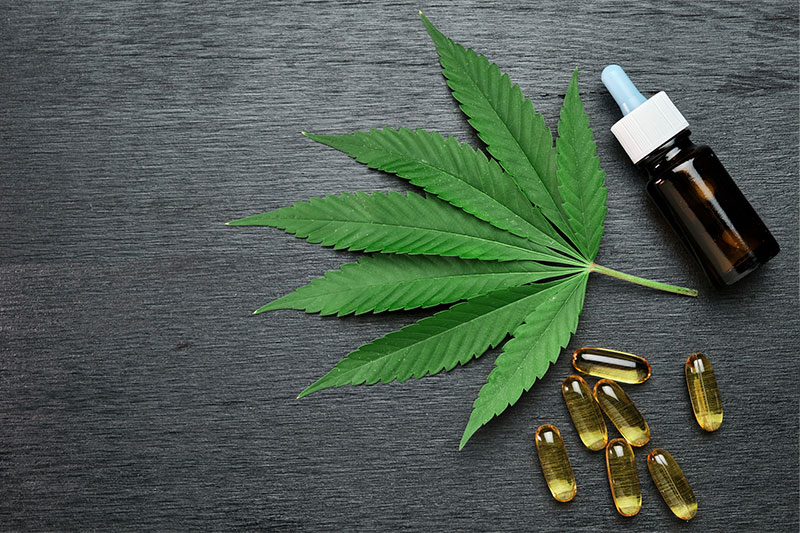CBD has emerged as a promising candidate in the wellness department. Known for its therapeutic benefits, it is a non-psychoactive compound present in the cannabis plant. The increasing popularity of CBD has attracted the attention of asthma patients, who are skeptical about its potential for relieving their symptoms.
Hemp-derived cannabidiol is federally legal in the USA, and people are becoming more open towards adopting it into their daily routines. Recent studies have shown that CBD might help treat a variety of disorders, including anxiety, chronic pain, arthritis, cancer, ADHD, etc.
Asthma is a public health problem that currently has no cure. The entrance of irritants and allergens in your respiratory system can trigger asthma symptoms, which can be deadly if not treated immediately. In 2017 alone, over 3500 people reportedly died from complications due to asthma. Moreover, it is the leading cause of hospitalization among children under the age of 15. Since there is no cure for it, extensive care and preventive measures are a person’s best bet.
With CBD being on the top of their list, researchers are trying to find new and effective treatment methods for alleviating the symptoms of asthma.
The question is: Can you use CBD oil for asthma?
Let’s find out!
What is Asthma?
Asthma can affect people of all ages and usually lasts for a long time. People with asthma have difficulty breathing because of swollen airways in their lungs. Consequently, the person’s airways become constricted, causing a buildup of mucus inside. Too much mucus can block these passages, reducing the amount of respiratory function and the absorption of oxygen into the blood.
For most people, managing asthma with conservative treatments and lifestyle changes is possible. For others, it can disrupt their daily routine and even result in an unannounced asthma attack that might be fatal.
The severity of asthma can change over time, and you need to have a clear understanding of its symptoms, causes, types, etc. to make sure you adjust your treatment relatively. If you or someone you know shows any signs and symptoms mentioned below, we suggest that you immediately consult with a doctor for a timely diagnosis.
Causes
Although we still don’t know why some people are affected by asthma and others are not, medical experts believe that environmental and genetic factors might play a crucial role. Furthermore, several risk factors can increase the likelihood of a person developing asthma and even contribute to their symptoms. These include:
- A family history of asthma patients
- Obesity
- Smoking
- Exposure to pollutants such as passive smoke, chemical fumes, and dust
- Respiratory infections
- Allergies such as hay fever that cause respiratory problems
- Exposure to airborne allergens, including pollen, dust mites, spores, and cockroach waste particles
- Gastrointestinal reflux disease (GERD), a condition that causes stomach acid to flow into your alimentary canal
Symptoms associated with asthma
The symptoms of asthma can vary from person to person. Some people might experience asthma attacks frequently, while others have symptoms when doing certain activities such as physical exercise. Asthma attacks occur when these symptoms are at their peak. The duration of these attacks can vary from a few hours to days. You should look out for the following signs and symptoms:
- Difficulty breathing
- Pain and pressure in the chest
- Wheezing (whistling sound when breathing)
- Cough episodes that get worse during a cold or flu
Allergic Asthma
Allergic reactions occur when certain compounds stimulate our immune system to generate a response and identify them as foreign substances. These compounds are known as allergens, and they can be harmful to our bodies.
When the immune system reacts with allergens in our body, it causes the release of histamine through specialized cells called mast cells. The presence of histamine can make you develop flu-like symptoms such as a runny nose, itchy skin, and watery eyes. Continuous allergies might lead to a person developing asthma at some point in their lives.
Allergic asthma attacks cause fluid buildup in the airways of the lungs, blocking them in the process. These airways are responsible for keeping out any harmful substance from your body and contain several of the mast cells that trigger the release of histamine.
Non-Allergic Asthma
Sometimes asthma attacks are triggered without the need for an allergic reaction or the release of histamine. Physical exercise and exertion can trigger a form of asthma known as non-allergic asthma.
The central nervous system controls most of our regulatory functions, including the amount of oxygen that can pass through airways leading to the lungs. During physical activity, the central nervous system makes these airways wider so that more oxygen can pass through and narrows them when we stop exercising to keep out allergens and preserve heat.
The narrowing of these airways and our central nervous system’s disability to widen them during physical exertion can lead to a person developing asthma symptoms. Certain prescription drugs and exercise can lead to this form of asthma.
When to visit the doctor?
Sudden asthma attacks can be life-threatening if not treated urgently. You should consult your doctor to get a better understanding of what to do when an attack occurs. However, you should seek emergency treatment if the following occurs:
- Continuous episodes of breathlessness and wheezing
- No improvement in symptoms even after using an inhaler
- Difficulty breathing during minimal physical activity
How is Asthma Usually Diagnosed?
Your doctor will check you for symptoms and might even recommend tests that eliminate the possibility of other chronic obstructive pulmonary disorders that have similar ones.
The initial physical examination will include the doctor asking you a couple of simple questions that will be related to current symptoms, family history, and any allergies or ailments in the past.
For further clarification, you may go through a lung function test that measures your breathing capacity. Some lung function tests include peak flow and spirometry. They analyze how forcefully you exhale and inhale air. The doctor will give you a bronchodilator to ease your airways. If the results of your lung function test are better after you have taken the medication, you are more likely to have asthma.
There are other ways your doctor can diagnose you for asthma. These include:
- Allergy Tests
- Imaging Tests
- FeNO Test
- Provocative testing of the airways
- Methacholine Test
Some Conventional Treatments for Asthma
Right now, there is no permanent treatment for asthma, but you can still manage the condition by reducing symptoms and preventing any complications from arising. Most asthma patients try to understand the scope of their illness, identify triggers that can lead to asthma attacks, and take sustainable, preventive measures to keep them from happening.
Having asthma does not mean the end of the world, and you can still lead a healthy and productive life by making necessary changes to it. Treatment options for asthma patients range from emergency treatments such as inhalers to long-term medications.
Your doctor will devise a treatment plan based on your needs, age, and severity of the condition:
Emergency Medications
In case of an asthma attack, it is crucial to bring your breathing function back to normal and clear your airways. Emergency medication can make this happen. Common emergency treatments include:
- Quick-relief inhalers – contain swift and efficient bronchodilators known as albuterol or levalbuterol. They ease the airways and clear any obstruction that is causing breathing difficulty.
- Corticosteroids – this is a quick-relief medication that targets inflammation of the airways. You can ingest it or administer it into your bloodstream intravenously. Some examples are prednisone and methylprednisolone. Corticosteroids can have side effects so take them on a need-only basis.
- Anti-inflammatory drugs – inflammation of the airways is a common symptom of asthma, and these medications can provide relief.
- Nebulizers – these contain aerosol bronchodilators and humid air that you can breathe in using a mask. Inhaling from a nebulizer offers deep relief and easing of airways.
Long-term Medications
For most people, a combination of emergency and long-term medications works best for reducing the symptoms of asthma. However, continuous use of synthetic drugs can have long-term consequences on your body too.
There are a variety of prescription drugs that you can take for an extensive period. These may include:
- Long-acting beta-agonists
- Theophylline
- Leukotriene receptor antagonists (LTRAs)
- Corticosteroids inhalers
- Combined inhalers (corticosteroids + beta-agonists)
The Benefits of Using CBD Oil for Asthma
While there is limited scientific research to back claims regarding CBD oil as a potential treatment for asthma, recent studies have shown that CBD might act as a preventative measure and ease symptoms.
CBD interacts with our endocannabinoid system, which is responsible for regulating several bodily functions, including mood, sleep, immune response, and metabolism.
See all CBD oil benefits here.
There are several benefits of using CBD for asthma, and we recommend choosing the right products so that you can get the most out of your experience. CBD is a natural anti-inflammatory substance that might reduce mucus production, clear airways of any obstructions, and prevent symptoms of asthma that can lead to a deadly attack.
CBD prevents inflammation of the airways
A study published in the Mediators of Inflammation journal suggested that CBD might reduce inflammation of the airways. Researchers used asthmatic rats, split into three groups, to test the effects of CBD, with only one of the groups given the cannabinoid.
The results were quite promising as CBD reduced the production of cytokines in the body. The release of cytokines occurs when T-cells from the immune system recognize a foreign substance in the lungs. Cytokines are responsible for inflammation of the airways that results in breathing difficulties.
CBD, as a natural anti-inflammatory, substance prevents T-cells from releasing cytokines, reducing inflammation, and making breathing easier. CBD can also significantly reduce the pain associated with inflammation.
CBD reduces mucus production
High levels of cytokine IL-13 in the airways cause excessive production of mucus. Mucus buildup can block the airways and make it difficult for you to breathe, increasing the symptoms associated with asthma and the chance of having an asthma attack.
CBD reduces the levels of IL-13 cytokine in the body and prevents the overproduction of mucus that can lead to severe asthma attacks. It also makes it easier for you to remove mucus from your lungs by coughing.
CBD might prevent bronchospasms
Bronchospasms are involuntary, rapid expansion and contraction of muscles in the bronchial tubes. They are a common symptom of asthma and can lead to your airways becoming constricted, causing breathlessness and wheezing.
A 2015 study conducted on sclerosis patients suggests that CBD might possess antispasmodic effects. Oral administration of equal proportions of CBD and THC in a drug showed improved muscle elasticity and a reduction in the potential for spasms. While this study is not specific to asthma patients, it shows the promise CBD has for preventing related symptoms.
CBD Prevents Airways From Being Blocked
The bronchial tubes of asthma patients are narrower than usual and can become blocked. A recent study published by the Institute of Clinical Pharmacology in Germany outlines that the interaction of CBD with our endocannabinoid system can prevent obstructions in the air passages.
The endocannabinoid neurotransmitter called anandamide might have a direct influence on these obstructions. When anandamide concentrations were high, the severity of bronchial blockage and inflammation reduced significantly.
CBD inhibits the enzyme that breaks down anandamide in our body and increases the levels of the neurotransmitter, eliminating obstructions, promoting improved breathing, and reducing overall symptoms.
Best Ways to Take CBD for Asthma
It is quite clear that smoking CBD is not the perfect option for asthma patients, and using any form of smoke-related products such as vape or dabs pose potential health risks for them.
So how should you take CBD if you have asthma?
Well, there are a variety of CBD products ranging from full-spectrum to broad-spectrum variants. These versions provide you with added benefits as they contribute to the entourage effect associated with CBD Oil. There are also CBD Isolate alternatives that provide you with a pure, unadulterated cannabinoid content.
We recommend using products consumed orally or sublingually, as they reduce the risks associated with smoking or inhaling CBD. You can choose between CBD edibles such as gummies or make them at your home. You can also try CBD tinctures, oils, capsules, or pills as they are more convenient, and you can easily add them to your daily routine.
Dosage is key!
CBD affects every individual uniquely, and finding the right dose to treat asthma symptoms can be a little tricky. Most people prefer high dosing to get the maximum relief out of the product they are using.
However, if you are new to CBD for asthma, we recommend taking things slow, starting with low dosages, and progressing as things move on. You can find the most suitable dosage for you this way and take your experience with CBD to new heights. Moreover, people with allergies should be extra careful when using CBD oil for the first time. Start with a small dose, and if no allergic reactions or effects show, continue usage.
Are there any side effects of using CBD for Asthma?
Like every other medication, CBD can also have side-effects. What’s important to know is that the good always outweighs the bad when it comes to using CBD products. Here is a list of potential symptoms that a person may experience from CBD:
- Dry mouth
- Drowsiness
- Lightheadedness
- Fatigue
- Diarrhea
CBD For Asthma in Cats – Is it safe?
Seeing your cat experiencing breathing problems and other symptoms associated with feline asthma can be a terrifying experience. While corticosteroid treatment is available for cats and can help manage symptoms, it comes with tons of side effects that can put your fur baby at the risk of developing Urinary Tract Infections and Cushing disease.
There are several CBD products available at our shop, specifically designed for pets, and you can use them to make your cat feel better and do better.
A Promising Treatment for Asthma Patients – Explore The Benefits of CBD Oil
Inflammation of airways, overproduction of mucus, and prevalence of bronchospasms can put an asthma patient at risk of experiencing asthma attacks that can be deadly.
CBD and its interaction with our endocannabinoid system might be beneficial in relieving most of these symptoms and can pave the way for a potential long-term medication with minimal side-effects for asthma patients.
However, there is a need for proper scientific research and we recommend consulting with your doctor before you opt for CBD as a medical treatment. If you are new to CBD and want to try high-quality products, feel free to visit our shop and choose from the best brands in the market right now.
FAQs About CBD Oil for Asthma
Question: What is Asthma?
Answer: Asthma is a chronic, pulmonary disorder that is categorized by repeated episodes of breathlessness and wheezing. It can be deadly if not treated properly.
Question: What are the symptoms of asthma?
Answer: Symptoms of asthma include difficulty breathing, feeling of pain, and pressure in the chest, wheezing, etc.
Question: How can CBD help treat asthma?
Answer: CBD has shown to reduce inflammation of the airways, prevent overproduction of mucus and bronchospasms, all of which are primary symptoms of a person with asthma.
Question: What are the best ways to take CBD oil for Asthma?
Answer: Smoking and vaping are not preferred as it can increase the risk factors associated with asthma. We recommend using edibles, tinctures, oils, capsules or pills as they are more convenient and easy to add to your daily routine.
Question: Is CBD oil safe for cats with Asthma?
Answer: Yes, there are CBD products specifically designed for pets and it can help them feel better and do better.









